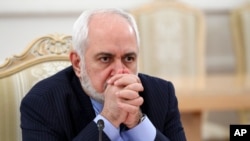Iran’s foreign minister warned that the Iran nuclear deal could be further jeopardized if the U.S. does not ease sanctions against the Middle Eastern power by Feb. 21.
Mohammad Javad Zarif, in an interview published Saturday in the Iranian newspaper Hamshahri, said recently passed legislation compels the government to harden its position on the issue. He also noted the possible June election of a hardline president could further endanger the pact.
“Time is running out for the Americans, both because of the parliament bill and the election atmosphere that will follow the Iranian New Year,” Zarif said.
Iran’s new year starts on March 21, three months after a parliament led by hardliners passed legislation establishing a two-month deadline for easing the sanctions.
In 2018, former U.S. president Donald Trump withdrew from the deal signed in 2015 by Iran and several other world powers, alleging it failed to curb Iran’s missile program and its growing influence in the Middle East.
Iran announced last month it had resumed enriching uranium up to 20% purity at its Fordow enrichment plant, a level it attained before the agreement was reached. Iranian officials said last week enrichment capacity was increased at its Natanz facility.
U.S. President Joe Biden, who has long criticized Trump’s decision to withdraw from the pact, has vowed to re-enter the agreement, known as the Joint Comprehensive Plan of Action, if Tehran resumes strict compliance.
Under the deal, some sanctions against Iran were lifted in exchange for reducing its nuclear activities. Iran has demanded that the U.S. ease sanctions before it resumes compliance and rejected talks on broader security issues.
Biden has said little publicly about Tehran since winning the presidency, but some U.S. media reports suggest his administration is quietly working to address Iran’s nuclear and missile programs, as well as Tehran’s regional activities, with the intent of determining whether and how to rejoin the agreement.
According to CNN, Robert Malley, Biden’s special envoy for Iran, is among several high-level officials seeking solutions to the dilemma. Malley is developing a team of experts with different perspectives on Iran, while reaching out to members of Congress.
Secretary of State Antony Blinken spoke with European allies on Friday, as the White House National Security Council held a high-level meeting to discuss Iran’s nuclear enrichment activities and next steps of action.
The Biden Administration is also exploring ways to relieve the financial pain the harsh U.S. economic sanctions have inflicted on Iran without lifting them.
Options include providing support for Tehran to receive coronavirus relief loans from the International Monetary Fund and easing sanctions that have thwarted efforts to get international coronavirus aid into the country, according to four people familiar with the administration’s plans who spoke with Bloomberg News.
The sources also said Biden could sign an executive order reversing Trump’s withdrawal from the agreement. Waiving sanctions to allow the oil-rich country to sell oil on the global market is not under consideration, the sources said.
Reversing Trump’s decision to pull out of the agreement may become even more difficult on Feb. 21, the date on which Tehran has threatened to stop complying with a series of voluntary measures that allow the International Atomic Energy Agency to conduct snap inspections of its nuclear facilities.
Moving to rejoin the pact is opposed by many Republicans in Congress. This week, 52 GOP lawmakers signed a letter urging Biden to continue the Trump Administration’s “maximum pressure” policy. The letter claimed the strategy has emboldened protesters within Iran and shifted the power balance in the Middle East, including several countries normalizing ties with Israel.







